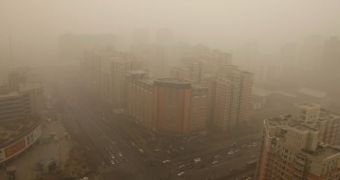As previously reported, the people living in Beijing and in several other parts of China have for some time now been battling an unprecedented increase in the local levels of air pollution.
Ironically enough, it was only this past Thursday that the country's capital, together with other northern and eastern cities, also got hit by massive sandstorms.
It goes without saying that, once the smog and the sandstorms became acquainted to one another, local air quality was diminished to such an extent that the country's high officials were left with no choice except ask people to remain indoors.
Furthermore, they emphasized the fact that people must only leave their homes should they have urgent matters to solve.
“Smog had already been forecast but now there's a sandstorm mixed together! So I can't open my eyes or mouth,” one of Beijing's residents told members of the press.
“I was shocked this morning when I awoke to see yellow skies. I'm already used to smoggy skies. But as for the moment and this sandstorm, I feel like this has been one disaster after another,” another one argued.
Pictures leaked to the public show how those who did venture out on the street had to protect themselves with facemasks which served to keep the sand and the smog out of their lungs.
While Chinese officials maintained that this Thursday's PM 2.5 reading for the city of Beijing was one of 400 micrograms per cubic meter, the staff at the US Embassy argued that it had in fact reached 506.
According to Daily Mail, the regions of Tianjin, central Wuhan and Qingdao were hit the hardest.
More precisely, it appears that both air quality and visibility in these areas were so poor that flights found themselves delayed and major roads were closed so as to prevent accidents.
Specialists working with China's National Meteorological Center explain that these storms were made up of sand blown to this country from Inner Mongolia and the Gobi desert.
By the looks of it, the Chinese people are eager to witness the country's high officials doing something in order to halt this pollution spike.

 14 DAY TRIAL //
14 DAY TRIAL //